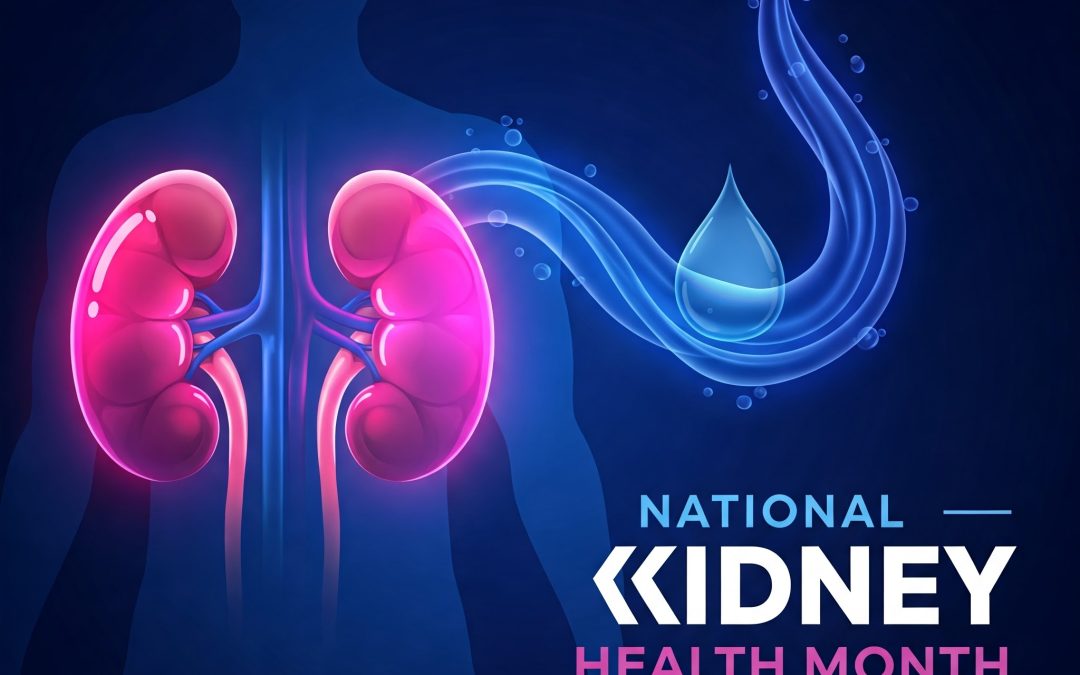March is National Kidney Month
Understanding Chronic Kidney Disease and Protecting Your Kidney Health
Your kidneys may be small, but their impact is mighty. March is National Kidney Month, a time to raise awareness about Chronic Kidney Disease (CKD)—a silent yet serious condition affecting millions. This month, we’re sharing vital information to help you understand kidney function, identify risks, and take proactive steps toward long-term kidney health.
What Do Your Kidneys Do?
Each kidney is about the size of a fist, and together they filter nearly 50 gallons of blood every day. Their critical roles include:
-
Filtering Waste – Removing toxins and excess fluids via urine
-
⚖️ Balancing Electrolytes – Regulating sodium, potassium, and phosphorus
-
❤️ Controlling Blood Pressure – Releasing hormones like renin
-
Supporting Red Blood Cell Production – Stimulating bone marrow via erythropoietin
-
Maintaining Bone Health – Activating vitamin D for calcium absorption
What is Chronic Kidney Disease (CKD)?
CKD is a progressive loss of kidney function over time. Often called a “silent disease,” many don’t know they have it until it’s advanced. CKD is classified into five stages:
-
Stage 1: Mild damage
-
Stage 5: Kidney failure (end-stage renal disease)
Who’s at Risk for CKD?
You may be at higher risk if you:
-
Have diabetes (the leading cause of CKD)
-
Have high blood pressure or heart disease
-
Are 60+ years old
-
Are overweight or obese
-
Have a family history of kidney problems
-
Belong to a racial or ethnic minority group (especially African Americans, Hispanics, or Native Americans)
Warning Signs of CKD
CKD often shows no symptoms early on, but may progress to include:
-
Swelling in feet, ankles, hands, or face
-
Fatigue or difficulty concentrating
-
Nausea, decreased appetite, or a metallic taste in the mouth
-
Itchy or dry skin
-
Changes in urination (color, frequency, or foamy texture)
How to Protect Your Kidneys
-
Manage Blood Sugar & Blood Pressure – Essential to slowing damage
-
Stay Hydrated – 6–8 glasses of water daily unless otherwise directed
-
Follow a Kidney-Friendly Diet – Limit sodium (under 2,300 mg/day), processed foods, and excess protein
-
Avoid NSAIDs When Possible – Overuse of ibuprofen or similar drugs can harm kidneys
-
Quit Smoking – Smoking reduces kidney blood flow and accelerates decline
-
⚕️ Get Regular Screenings
-
eGFR test – Measures kidney filtration ability
-
ACR test – Detects protein in urine (early damage indicator)
-
A Local Story: Catching It Early
Carlos, a 60-year-old DMV resident with high blood pressure, discovered early-stage CKD during a routine exam. With prompt action—like reducing sodium, exercising regularly, and sticking to prescribed medications—Carlos has successfully slowed the progression of CKD and continues to enjoy a healthy, active lifestyle.
Helpful Kidney Health Resources
-
National Kidney Foundation – Risk quizzes, nutrition guides, and support programs
-
CDC – Kidney Disease Prevention – National data and tips
-
NIDDK – Research and free educational materials
-
American Kidney Fund – Financial support and patient education
-
Local Clinics & Screenings – Many DMV community health centers offer free kidney screenings this month. Contact your local health department to learn more.
Start Taking Care of Your Kidneys Today
Kidney disease may be silent, but your choices speak volumes. Early action can slow or prevent kidney damage. During National Kidney Month, take a moment to assess your risk, talk to your doctor, and make small changes that lead to better kidney health.
Dr. Bertrand Fote, MD, MBA, FACEP, CF²
Emergency Medicine Physician | Physician Leader | Advocate for Community Health & Wellness

